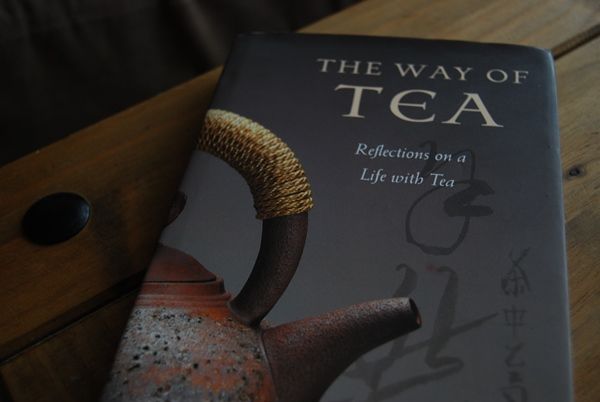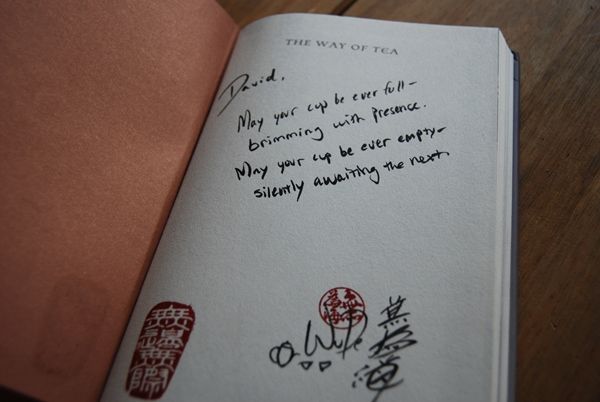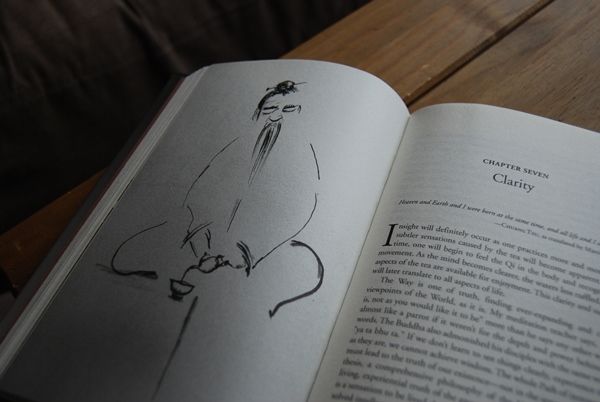I have something of a history with The Way of Tea.
This time last year, Mr. Aaron Fisher posted me a copy of his book to review. It was a warm Hilary term, and I remember reading it in between giving tutorials in my college of the time. I sat in my favourite armchair in the SCR, looking out over the back quadrangle - which is more a big expanse of grass bordered by large pines.
In the picture below, my old friend, the armchair, was positioned in the full light of the second window to the right of the door. The grandfather clock ticked heavily nearby, the lapsang-and-lemon steamed in a chipped little cup on the windowsill, and the pages of Mr. Fisher's book came and went.
It's a pleasant memory of a happy time - I have since moved to the other side of town, where the SCR is a little more traditional, and a little less like my grandmother's parlour. My dear grandmother passed away that year, too, and so the impression left by my old college's rooms seems poignant.
During that time, I was also sanding down a long staircase in my house. It was, unsurprisingly, a dusty job, and I remember picking wood-dust out of my ears for days afterwards. Throughout one entire eight-hour day, spent sanding that staircase, I debated with myself about how best to write about Mr. Fisher's book. I couldn't solve the problem, like a good koan, no matter how much I turned it around in my mind's eye.
The term carried me onwards, in its ever-increasing schedule of research, tutorials, and revision classes, and the task of writing about The Way of Tea slipped to the back of my mind, and, eventually, out of it.
Last week, our house renovations completed in one of the downstairs rooms, we unpacked our boxes of books into the bookcases that had just been erected. Among with all of my old companions, from Crime and Punishment to Green Eggs and Ham, was The Way of Tea.
What do you make of tea books? To my tastes, the field from previous years is rather rotten - so many feel rather amateurish, filled with mistakes, are poorly-edited, and contain cliches that a competent editor should have removed. Given my consistently unsatisfactory prior experience of books about tea, Mr. Fisher's book always had a long way to go to win my affections.
Like that day spent sanding my staircase, I still find it difficult to write about - just like it is hard to write about the way one wrestles with a koan.
I do admire Mr. Fisher's obvious commitment and passion to the world of tea. Many of us will be familiar with his on-line tea magazine, The Leaf, which he makes available for no charge. This is an act of generosity that we must appreciate, because it must take a great amount of effort to produce.
Similarly, I very much admire Mr. Fisher's paintings and sketches, one of which is reproduced from The Way of Tea in the image below. They follow a classically open oriental style, even touching on Zen painting in places. If you will forgive me for doing so, one could almost use the word "sumptuous" to describe his artwork.
Finally, I feel that Mr. Fisher and I would have a great deal to talk about over a cup of tea, given that some of our interests align so clearly. His topics include tea (of course), frequently mention Daoism, and make reference to Zen. These are subjects that are dear to my own mind, as long-time readers of this humble web-site may have concluded. Indeed, if it was not the Half-Dipper that inspired chapters on ceremony (Mass, Ritual, and Tea) and cleaning up after a session (Ending a Session), then we at least share similar opinions.
So, then, where is the difficulty? Why all the fuss during that long day of sanding?
I do admire Mr. Fisher's obvious commitment and passion to the world of tea. Many of us will be familiar with his on-line tea magazine, The Leaf, which he makes available for no charge. This is an act of generosity that we must appreciate, because it must take a great amount of effort to produce.
Similarly, I very much admire Mr. Fisher's paintings and sketches, one of which is reproduced from The Way of Tea in the image below. They follow a classically open oriental style, even touching on Zen painting in places. If you will forgive me for doing so, one could almost use the word "sumptuous" to describe his artwork.
Finally, I feel that Mr. Fisher and I would have a great deal to talk about over a cup of tea, given that some of our interests align so clearly. His topics include tea (of course), frequently mention Daoism, and make reference to Zen. These are subjects that are dear to my own mind, as long-time readers of this humble web-site may have concluded. Indeed, if it was not the Half-Dipper that inspired chapters on ceremony (Mass, Ritual, and Tea) and cleaning up after a session (Ending a Session), then we at least share similar opinions.
So, then, where is the difficulty? Why all the fuss during that long day of sanding?
I spent a lot of my life writing. During my professional hours, I write scientific publications, reading the works of my students, offering long pages of corrections in red ink, and filling up logbook after logbook with descriptions of experiments. During my private life, I spend many hours writing my journal, into which I sometimes write my thoughts on tea, if I am at the tea-table. (Perhaps a fifth of my journals are tea notes, these days - the rest being thoughts, haiku, commentaries, and other such nonsense.)
This is quite a lot of writing. I am not a great writer, nor a great poet, but I think it's fair to say that I am a solid "work-a-day" artisan. While not one who could produce a Mona Lisa, I could have a good attempt at providing something that looks at least pleasant, literarily speaking. Much of whatever small talent I have comes from working directly with my supervisor, a senior chap, whose quantity of red pen on my writing is matched only by the quantity of red pen that I now inflict upon my own students. The dreaded red pen taught me a great deal about how to write, and how to think.
So, while not a literary talent by any means, I feel that I am least sufficiently able to get a piece of text into shape.
My concerns with The Way of Tea, then, are almost entirely those of style and construction. If you like the style in which Mr. Fisher writes The Leaf, or the style in which he writes his informative articles in The Art of Tea, then you will surely take away a great deal of pleasure from The Way of Tea.
In fact, my opinion is entirely moot - consider the book to be a larger version of the magazine, focussed on the Dao of tea, and you'll have a very accurate estimate of how well you'll enjoy the longer material.





4 comments:
I was just wondering about purchasing the book so thank you for the insight. Hope that some "armchair" days will come to my doors too- I will go for it..
best
Petr
Dear Petr,
Thanks for the comment - I hope that you enjoy the book, if you decide to buy it. Perhaps you can let us know how you get on!
Toodlepip,
Hobbes
Nice to read your thoughts on this book, and I had actually wondered who else had received copies. I have read the book in its entirety twice now, and thinking of trying to make time for a third, but ever since grad school started, My free time is greatly diminished.
I will say that I feel the first chapter was very take it or leave it, in the sense that it either was your thing or it was not. But most of the other chapters I feel have a much wider appeal to the general tea book reading audience.
Dear Adam,
You certainly get good mileage from your books. :)
I read your coda to an article touching on Zen in The Leaf with great interest. Sitting on your cushion is the hardest thing in the world - hang in there.
Toodlepip,
Hobbes
Post a Comment